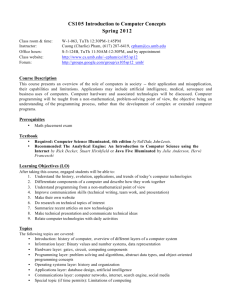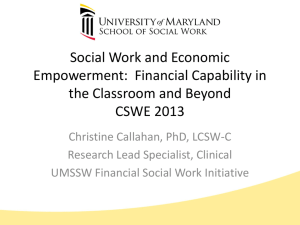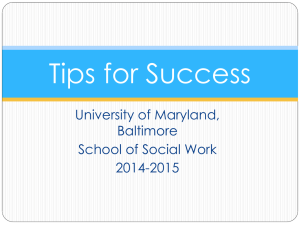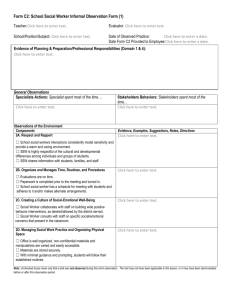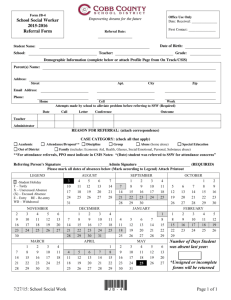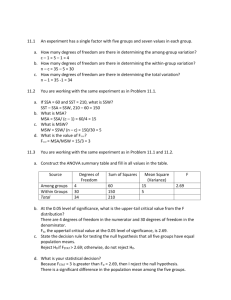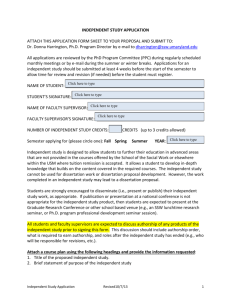School of Nursing - UMB Digital Archive
advertisement
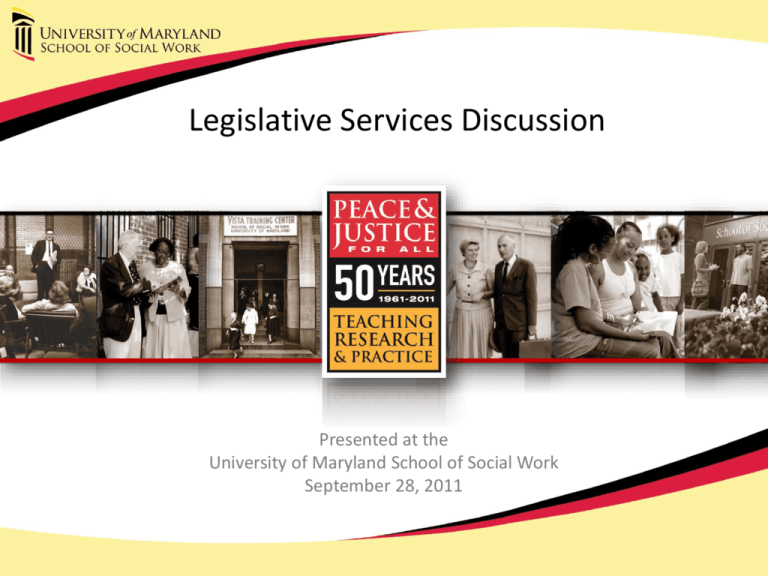
Legislative Services Discussion Presented at the University of Maryland School of Social Work September 28, 2011 School of Social Work FY 2011 State Support Revenues $814,471 state appropriation is down $159 K due to salary reduction FY 2007 – FY 2011 Actuals (In Millions) FY 2007 - 2011 Actuals (In Millions) 25,000,000 20,000,000 15,000,000 Restricted Revolving DRIF 10,000,000 State 5,000,000 0 FY 2007 FY 2008 FY 2009 FY 2010 FY 2011 Of our $24M+ budget we raise all but $1,000,000 ourselves UMB GRANTS AND CONTRACTS (FY06 – FY10) FY06 FY10 Variance Percent Change 170,048,000 436,092,209 266,044,209 156% Social Work 6,290,000 15,540,575 9,250,575 147% Pharmacy 9,273.000 16,062,318 6,789,318 73% Nursing 5,880,000 11,509,896 5,629,896 96% Dentistry 8,270,000 12,993,742 4,723,742 57% Law 2,496,000 4,676,900 2,180,900 87% Medicine 2nd Fastest Growing School re UMB Grants and Contracts--only steps behind SOM 4 Endowment Values ([As of December 31st, 2010] Values in Thousands) 7000 $6,258 6000 5000 $5,482 $4,986 $4,550 $4,268 $4,792 4000 3000 2000 1000 0 2005 2006 2007 2008 2009 2010 Modified Peer Institutions had a mean endowment of $17.9m and all public SSWs had a mean $3.9m in endowment Fiscal Section Summary • Our business model is strong under ordinary and, even, somewhat stressful circumstances • We receive relatively little state funding, compared to other units on campus, and compared to our modified peer institutions* (which average about $3M a year) • We have kept our tuition and fees low to attract students – We cannot add more students in our current building so tuition dollars can only grow from raising tuition • Grants have increased overall—current efforts are to increase grants with higher indirect costs (e.g., NIH funds). Office of Admissions Applications and Confirmations 2000-2010 1000 Applied Confirmed 900 800 700 600 500 400 300 200 100 0 2000 2001 2002 2003 2004 2005 2006 2007 2008 2009 2010 Enrollment (n≈960) by Race / Ethnicity Total SSW Minority: 39%* (n= 321) Modified Peer Institutions: (MPI: UNC, U Mich, UI C, U Wash, U Georgia) 28% (n=596) Note: UMB SSW had 37% minority enrollment in 2009 when the comparison to MPI was made Faculty Teaching Load & Salary* • Teaching load is 5.0 courses per year (vs. peer institutions of 4.5 courses per year) • Salaries are higher in Peer Universities* UMB Peers Professor Associate Professor Assistant Professor ^$114,374 $79,447 $70,398 $144,307 $92,899 $70,831 *Salaries for peer institutions are computed at 9-month rate and have been adjusted to 10-months to make comparable to UMB; ^UMB SSW Full Professor salaries excludes Dean and 2 professors with administrative roles FTE Positions at the SSW (2011) Total number of employees: 190 Teaching: 85%+ of Core Faculty Receiving Ratings of 4 or 5 (Very Good or Excellent) By Students on Summary Course Evaluation Items Post MSW Licensing Exam Pass Rates (1 Note: there is no data for peer institutions but the public-state institutions was 75% in 2009, the same as UM SSW st time) Privately Funded Scholarships Note: the SSW Goal is to celebrate having 50 Scholarships for our 50th Anniversary Continuing Professional Education Attendees Second largest Social Work CPE Program in USA after Rutgers Number of Child Welfare Academy and Foster & Adoptive Parent Training Participants Education and Training Summary • Social work students are benefiting from a small but growing number of scholarships – Our PhD program has been greatly strengthened in the last 5 years but is too small and in significant need of more scholarship support • Nearly 10,000 social workers receive education or training at UMB SSW each year – This is among the largest of any SSW in the nation – Our education and training programs stretch as far as CA, TX, NV, and India Public Service • 400,000+ hours of service from our interns each year • Community building in West Baltimore (Promise Heights) and many other Baltimore communities • Many guest lectures to organizations providing services to the public • Leaders of many public and nonprofit organizations are graduates of the SSW • SSW faculty and administrators are on many nonprofit boards and provide substantive expertise as well as expertise regarding planning and evaluation • Testimony to the MD General Assembly, United States Congress, and other states has recently been provided by our faculty Entrepreneurship in Social Work Creating, identifying, organizing, managing, implementing, and rigorously testing valuable interventions for use in social work and other professions. 1. Systematizing social work interventions for replication 2. Developing new inter-professional interventions 3. Replicating evidence based practices in Baltimore (Franchising) 4. Research infrastructure building through LINKS to enhance research capacity Replicating EBPs in Baltimore • Public Allies (Public Allies National) • ReServe (AmeriCorps) Retired Volunteers Program • KEEP (Oregon Social Learning Center [OSLC]) (Chamberlain [OSLC], (Uretsky, Greeno) • KITS (Kids in Transition to School) (Pears, OSLC) (under discussion for use in Promise Heights) • Traffic Light: Behavioral Family Therapy and Obesity Reduction (Epstein, SUNY-Buffalo) (under discussion for use in Promise Heights) • Strengthening Families Coping Resource Team (Family Focused Trauma Intervention developed in SOM, in use at Promise Heights) LINKs Data Collaborative at the University of Maryland Baltimore The LINKS data collaborative will be fully compliant with HIPAA, FERPA, and all agency regulations. MOUs/MOAs will be instituted across all participating agencies regarding shared data. DHR/SSA Child Welfare DHR/FIA Food Stamps DHR/FIA TANF DHR/CSEA Child Support Agency data is loaded onto a secure machine not connected to the internet. A Unique ID is assigned to replace identifying information using linking data. Only required linking data is maintained on the secure machine all other data is removed. DHMH/MHA Mental Health MSDE Education 1 The DHMH/MHA Pharmacy DHMH/MHA DDA LINKs Data Collaborative at the University of Maryland Baltimore (de-identified linked data) Agency data, stripped of personal identifiers, are linked by the Unique ID and maintained on a secure data server. LINKS Research Review Board1: A representative from each agency in the collaborative with the capacity and authority to review research proposals and make decisions related to the merit of the proposal and data usage will review all proposals involving LINKS. Agencies can decide not to allow their data to be used for a study. DJS Juvenile Services Data Linking/ Research Proposal (State Agencies) Data Linking/ Research Proposal (University) LINKS RRB will not replace the University or Agency IRB processes, only add another layer of protection. Data Linking/ Research Proposal (External Groups) Internal Challenges • • • • • Recruitment and retention of superb faculty Building a national (Top 10) reputation Space inadequacies Scarce resources for innovation Mentoring and retention of junior faculty o Few senior faculty are research leaders so much mentoring has to be obtained outside of UMB SSW • Hiring diverse faculty at all tenure track ranks • Post-audit demands on staff and faculty to revised business practices and more centralized approval processes External Challenges • Government Policy – Inclusion of social work in loan forgiveness programs – Recognition of social work care management practices as a health care service • State Budget – Budget freezes will eventually hurt the employability of our graduates – Salary freezes have created inequities among faculty • Information Technology – More support is needed for improving the usage of IT by faculty & staff Summary • We are dynamic and growing • The quality of our work, faculty, and students are excellent – Our space is not nearly as excellent and we need more • Our infrastructure has been stretched thin • We have untapped potential to partner with other units on campus to: – Interrupt the social epidemiology of disease – Enhance primary care services research and practice – Improve teaching, research, and service regarding behavioral health

